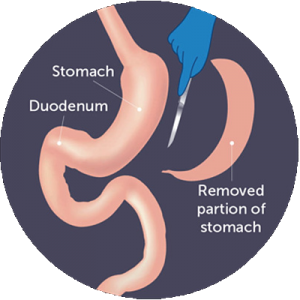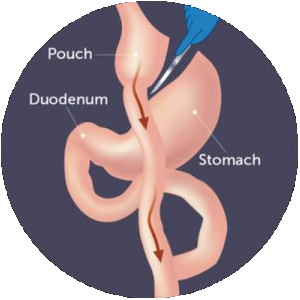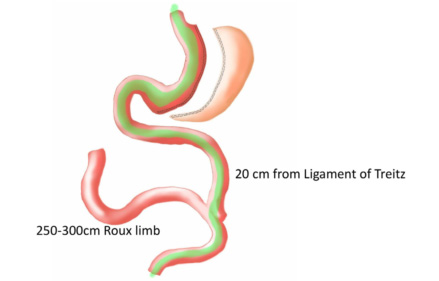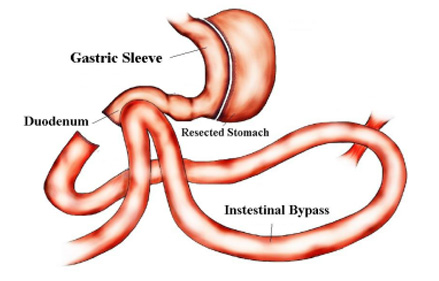What is Bariatric Surgery?
Bariatric surgery is an operation that helps you lose weight by making changes to your digestive system either by making the stomach smaller or bypassing a part of the small intestine. Bariatric surgery is an option for people with BMI above 32 kg/m2 with medical conditions. To be eligible for surgery you have to be investigated and optimized by a multidisciplinary bariatric team.
Types of Bariatric Surgeries:-
A) LAPAROSCOPIC SLEEVE GASTRECTOMY
It is a surgical weight-loss procedure in which about 70% of the stomach is removed, leaving a tube-shaped stomach about the size and shape of a banana. Limiting the size of your stomach restricts the amount of food you are able to consume, while also prompting hormonal changes that assist with weight loss.

B) LAPAROSCOPIC ROUX_EN_Y GASTRIC BYPASS
Laparoscopic Roux-en-y Gastric Bypass involves creating a small stomach pouch and bypassing a part of the small intestines. The rest of the stomach remains functional and remains connected to the intestine. This surgery results in hormonal changes which lead to better control of blood sugars in diabetic patients and other metabolic improvements.

C) Laparoscopic Proximal Jejunal Bypass + Sleeve Gastrectomy
Laparoscopic proximal jejunal bypass with sleeve gastrectomy (LPJB-SG) was first described by de Menezes in 2004 and involves performing a sleeve gastrectomy followed by transection of the small bowel and bypassing about 250cm-300cm of it. Previous studies have shown it to be effective in weight loss and in remission of type 2 diabetes mellitus.

D) Laparoscopic Duodenojejunal Bypass + Sleeve Gastrectomy
LDJB-SG is a novel surgical procedure which was first described by Huang et al in in 2011. This operative technique is a combination of restrictive & malabsorptive procedure, with the sleeve being the restrictive component and the bypass being the malabsorptive component similar to laparoscopic roux-en-y gastric bypass. LDJB-SG is a safe and feasible bariatric and metabolic surgery, which has demonstrated excellent outcomes in terms of weight reduction, co-morbidities resolution as well as glycemic control comparable to laparoscopic roux-en-y gastric bypass.

E) Revisional Bariatric Surgery
Revisional bariatric surgery is a procedure designed to address weight gain and other concerns that remain or reoccur in patients who have previously undergone bariatric surgery. The reasons for undergoing a revisional procedure can be dictated by many factors such as weight regain or complications of previous surgery. A revisional bariatric surgery is a decision that, like the initial procedure, should not be undertaken lightly. Various factors need to be considered including type of previous operation, reflux symptoms or complications, presence of hiatus hernia, previous bowel surgery etc. If patients have regained weight due to lifestyle reasons then they can avail the full support of the surgeon, dietitians and clinical psychologist to ensure success this time around. If you did not lose the amount of weight you wanted to or you regained weight after your surgery, a revision surgery can trigger improved weight loss and improve your results. Studies have shown that patients who undergo revisional surgery lose about 56 percent of their excess body weight, on average.

Surgical procedures performed and options for revisional surgery
